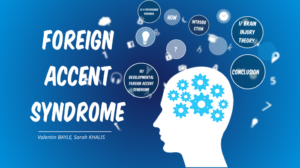Foreign accent syndrome (FAS) is speech disorder that causes a sudden change to speech so that a native speaker is perceived to speak with a “foreign” accent. FAS is most often caused by damage to the brain caused by a stroke or traumatic brain injury. Other causes have also been reported including multiple sclerosis and conversion disorder and in some cases no clear cause has been identified.
Although it’s extremely rare, it’s a real condition.
Speech may be altered in terms of timing, intonation, and tongue placement so that is perceived as sounding foreign. Speech remains highly intelligible and does not necessarily sound disordered.
FAS has been documented in cases around the world, including accent changes from Japanese to Korean, British English to French, American-English to British English, and Spanish to Hungarian.
Some common speech changes associated with FAS include:
- Fairly predictable errors
- Unusual prosody, including equal and excess stress (especially in multi-syllabic words)
- Consonant substitution, deletion, or distortion
- Voicing errors (i.e. bike for pike)
- Trouble with consonant clusters
- Vowel distortions, prolongations, substitutions (i.e. “yeah” pronounced as “yah”)
- “uh” inserted into words
How this is diagnosed:
Language skills will be tested. This can be done with:
- Reading, writing, and language comprehension tests
- Recordings to analyze speech patterns
Images will be taken of the brain. This can be done with:
- MRI scan
- CT scan
- Single-photon emission computed tomography (SPECT) scan
- PET scan
The brain’s electrical activity may be measured. This can be done with an electroencephalogram (EEG).
FAS is rare. A team of specialists may be needed to make the diagnosis.
Treatment for this condition:
The goal of treatment is to manage symptoms. Choices are:
- Speech therapy to learn how to better move the lips and jaw during speech
- Counseling to help cope with FAS
How to prevent this rare condition is to do the following:
There are no known guidelines to prevent this health problem. Stroke is the most common cause. People who are at risk for stroke should take steps to lower their risk.

